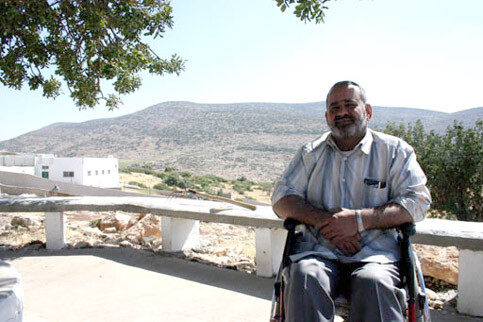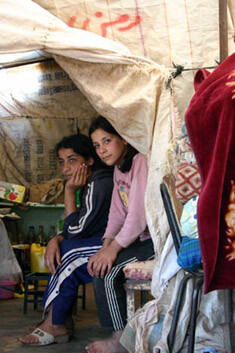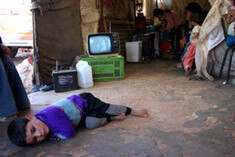The Electronic Intifada 30 April 2005

Haj Sammy in the center of Al Aqaba with on the background the kindergarten threatened with demolition.
The mountains of Palestine form a sharp edge that plunges into the Jordan Valley as if cut by a knife. Almost to the rim of this drastic landscape lies the village of Al Aqaba, located in the farthest Palestinian lands of the Jenin region. It is almost a no-man’s land, nestled in the soft rolling foothills of the towering mountains, stirred by the strong breeze cooling the hot spring day.
We went to Al Aqaba to speak with Haj Sammy, the mayor. When he was 16, Haj Sammy was shot twice by the Israeli military as he walked across the land to see his family. One of the bullets he still carries in his body, being too near his spine to safely remove. The military uses the land around Al Aqaba for their training practices, having killed 8 and wounded 50 since 1971. Haj Sammy’s wound is one such example. He has been paralyzed since.
Our discussion this day revolved around the current situation in Al Aqaba, of which there are several. There are currently 2 demolition orders from the Israeli military against the village. One order is for the 3 permitted buildings of the village and 17 homes. The 3 permitted buildings have all been recently built with the assistance of foreign government agencies and NGO’s. The village has hired a lawyer and taken this order to the Israeli courts, having won an injunction until June 6, 2005, when their case will be heard.

Two girls of one of the threatened homes.

The mosque of Al Aqaba, threatened with demolition.
The village medical clinic, open 6 days a weeks, with a doctor on duty 3 of those days, serves the entire eastern area of the Jenin region. The kindergarten has 60 students with 6 teachers, while the secondary school has an enrolment of 72 students with 4 teachers. Including the mosque, these are the permitted buildings of the village under the most recent threat of demolition.
The second order is for three homes of the village which house over 27 people, mostly children. The homes are Bedouin style, consisting of a series of tent structures and animal corals. This order was served within the last week, giving the residents 72 hours to evacuate. With only the verbal assurance from the local military captain that they will not serve out the order until the village is able to take the case to the courts, everyday is an uncertainty if the military will show up with bulldozers in order to carry out the order or not.
Al Aqaba also has a case of their own in the Israeli court system, fighting to stop the 2 military bases in the area. Since the 1970’s, the Israeli military has used the land around Al Aqaba as a training ground, having told the residents it is due to the similar landscape of southern Lebanon. From atop the kindergarten building of Al Aqaba, one can see the evidence on the surrounding landscape of this fact, with tunnels built underneath the hillside and a circle of bunkers dug a little further off. During our visit, F16 fighter jets regularly flew over head.

Inside one of the bedouin atyle homes.
threatened with demolition.
Only within the past year has Al Aqaba been granted permission by the Israeli military to wire electricity to their homes. In the 70s when the village was given a generator by the Palestinian Authority, the military entered the village and confiscated it after the residents’ initial attempt to use it. They still are required to haul water from a distant well due to lack of military permission granted and for the same reason, the roads into and out of the village are only partially paved.
With introductions and initial information about Al Aqaba shared, we began a walking tour. As we ventured the short distance from the medical clinic to kindergarten, it seemed to me that we were the only living souls within miles. The village was eerily quiet, except for the strong wind that blew. The only residents of Al Aqaba that I had seen, except for Haj Sammy, was the old man who had brought chairs for us to sit under the tree in what I assumed was the center of town, and the young school headmistress who had appeared as quietly as the old man had disappeared after serving us coffee. They seemed to materialize and vanish into the thick air like apparitions.
It felt like a ghost town, a village vacant save for these three souls I had encountered, which I was actually starting to question the existence of. I heard no voices, no laughter or calls of ‘what’s yer name’ from children amazed at the sight of foreigners. No vehicle had passed since our arrival. It’s unusual in a place like Palestine to encounter such stillness and quiet in the middle of a village. Generally, there are noises, motion, some sort of signs of life. Al Aqaba was different though, not feeling dead, but only uninhabited.
Before 1967, Al Aqaba was inhabited by 200 families, with an average of 10 people each. There are now 300 people that comprise the village. Much of the extreme decline in population, according to Haj Sammy, is due to the restrictions placed on the village by the Israeli military. Until quite recently, there was no ability for the village inhabitants to educate themselves, no work and since 1967 there has been a military ban on the people of Al Aqaba to build themselves new homes. The army also burns the grazing lands around the village, leaving the Al Aqaba shepherds no where to graze their flocks.
When you stand in the center of Al Aqaba, which in reality is only a stones throw from any point that is the edge of the village, it becomes clear that these multiple demolition orders issued by the Israeli military mean almost total destruction of the village. These orders, only the newest step in the war Israel has been waging against Al Aqaba since 1971, add to the list of building bans, prior demolitions and restrictions on the progress of infrastructure.
During our conversation, Haj Sammy repeatedly asked why a superpower such as Israel, with nuclear capabilities and a first world military, would care to make war on the people of the tents. We had no answer for him.
K. Flo Razowsky is a Minneapolis, Minnesota resident and long-time peace activist.
Related Links





